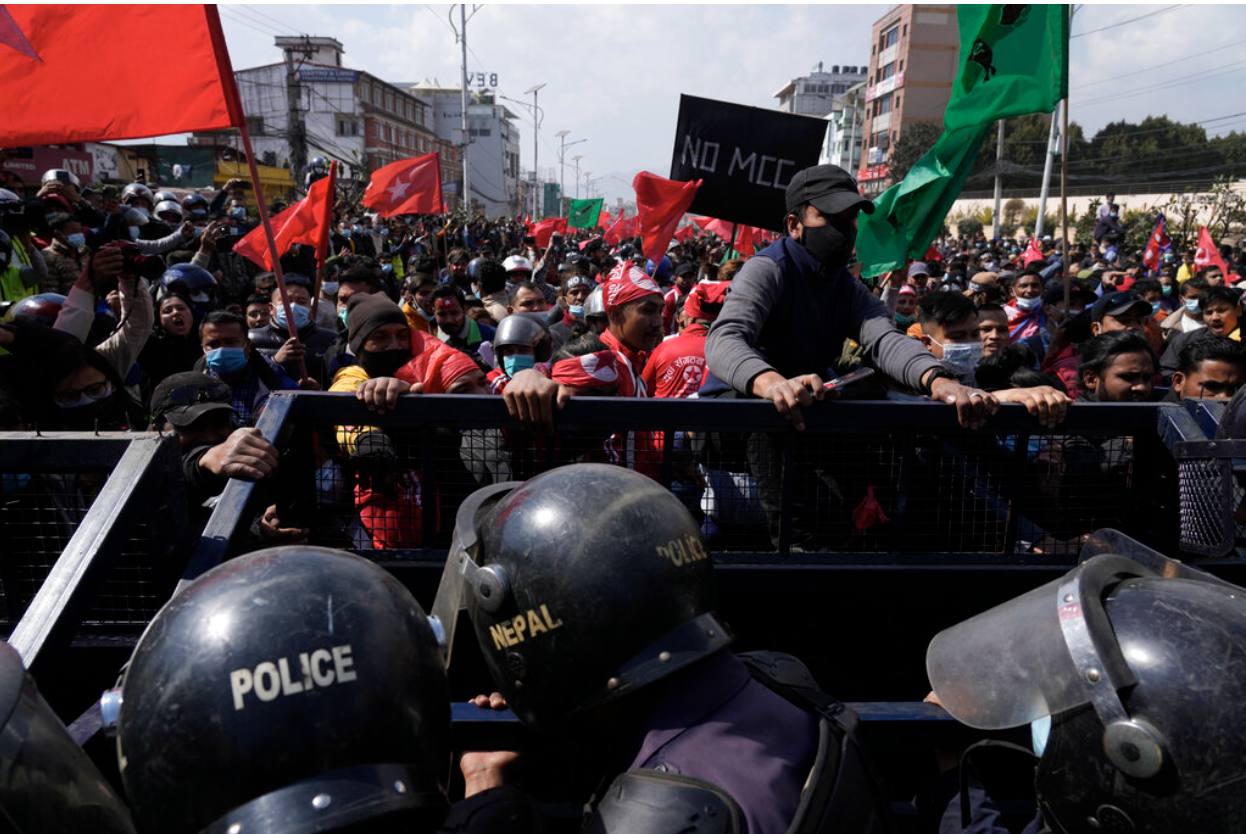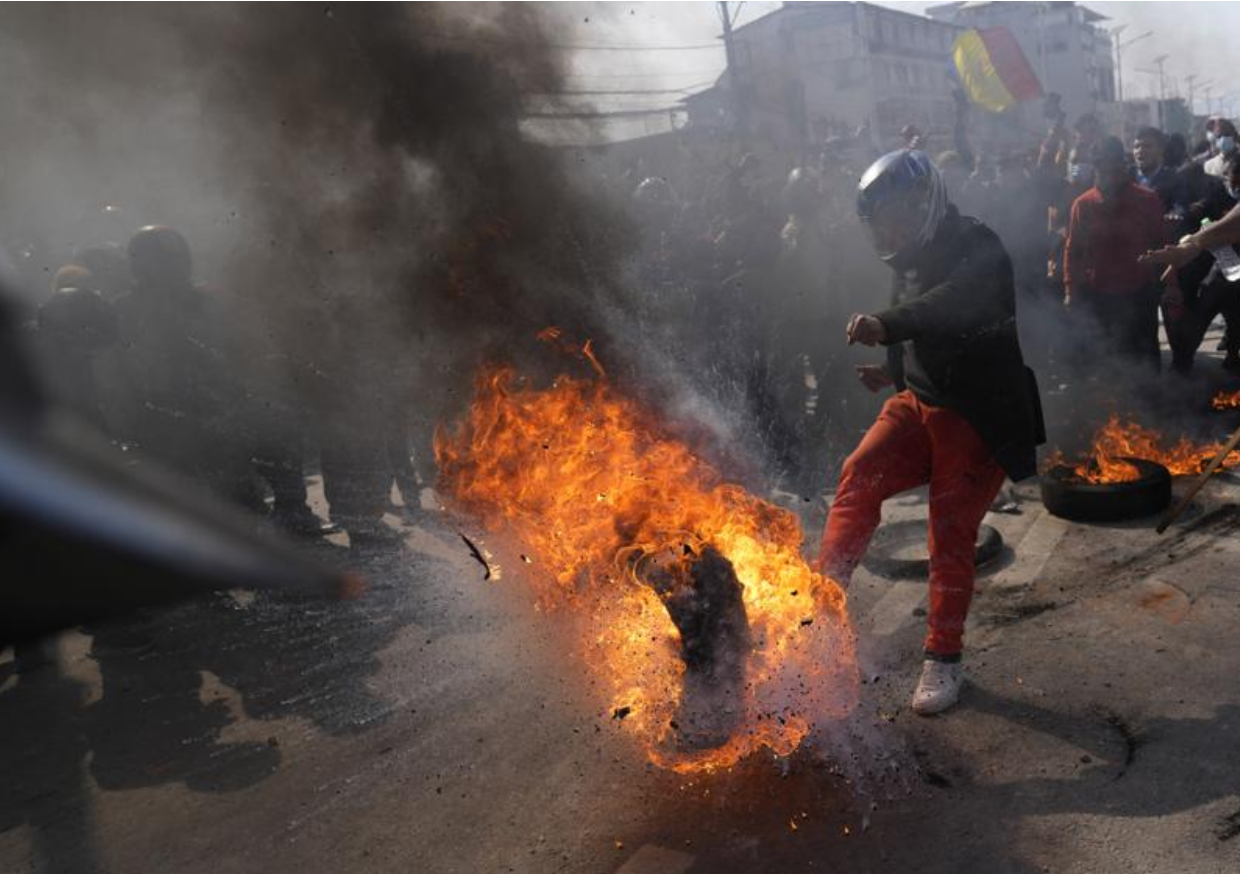American Aid Grant Deepens Political Divide in Nepal
Nepalese protesters opposing the Millenium Challenge Compact (MCC) in Kathmandu, Nepal on Sunday February 20th. Photo: Niranjan Shrestha/Associated Press.
Opposition to the Millenium Challenge Compact (MCC) continued with a more recent riot that took place in Kathmandu, Nepal this past Sunday as the deal was being proposed to Parliament. The MCC agreement is a $500 million American grant project signed in September of 2017. The project is supposed to help Nepal fund construction for hydroelectric transmission lines and updating of highways, in turn helping the Neplaese economy.
A series of protests have been going on since Feb. 16, to stop the project from being ratified. They have been led by the two communist parties in Nepal, who believe the agreement will allow American intervention into the country. However, American officials have reassured Nepalese leaders that the grant’s agenda is to only help develop Nepal and that the incumbent opposition stems from Chinese influence and manipulation of information regarding the deal.
As a result of the protests, the proposal was postponed yet again. This adds more pressure to the Nepalese proponents of MCC. “...if Nepali political leadership failed to endorse the MCC compact grant within the stipulated deadline of February 28, the US would be forced to review its ties with Nepal,” said U.S. Assistant Secretary Donald Lu.
The riot police used bamboo batons and fired tear gas and a water cannon to stop protesters from pushing through barbed barriers and pelting stones. Photo: Niranjan Shrestha/Associated Press.
The defiance for the bill is growing as domestic tensions between different political parties rise. Specifically, two communist parties that are a part of the coalition government have shown extreme resistance to the agreement, as they claim the agreement will allow for U.S. intervention that will jeopardize Nepal’s sovereignty. The communist parties say that the aid grant is a part of a plan to bring American soldiers to Nepal in line with the Indo-Pacific Strategy.
Prime Minister Sher Bahadur Deuba, of the Nepali Congress, has been trying to get the MCC passed through Parliament with no further delay to prevent any strain on Nepal’s relationship with the U.S. He is willing to split with the coalition government, as he may lose credibility on a global level if the deal does not go through.
The nation is two months away from its local elections and the MCC agreement has been at the forefront of the issues being discussed. Nepali distrust of Americans has been the driving force against the agreement despite any claims made by the U.S. government on its intentions with the agreement. This has trickled down to questioning the integrity of Nepali leaders in the country.
The skepticism of American intervention has long persisted in the socialist state, where the influential communist parties see America as an imperialist power. The current deal has only opened old wounds and deepened the political divide in the country.
The issue has been highly politicized, leading to a great deal of disinformation relating to the topic. There are thoughts regarding Chinese intervention in this case, spreading misinformation related to the bill in order to strain the relationship between the U.S. and Nepal. Lu went on to add that “it [the U.S.] would consider China’s interest behind Nepal’s failure to ratify the compact.”
Chinese Foreign Ministry Spokesperson Wang Webin said that “China welcomes the international community to cooperate with Nepal, contribute to Nepal’s economic development and livelihood improvement, but this should be done based on the Nepalses people’s willingness without political conditions.” While China has denied providing any funding for disinformation regarding the MCC, it has made its stance clear regarding the matter.
Interestingly, a similar deal was signed between Nepal and China called the Belt and Road Initiative (BRI), which also received pushback from India and America and pressured Kathmandu to reject the deal because of China’s “strategic implications.” Nepal recognized the urgent need to increase connectivity in the nation and yet the MCC is receiving more backlash than the BRI. Despite pressures from America and China, the MCC would help Nepal boost its economy by increasing connectivity and availability of electricity throughout the nation.


